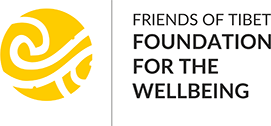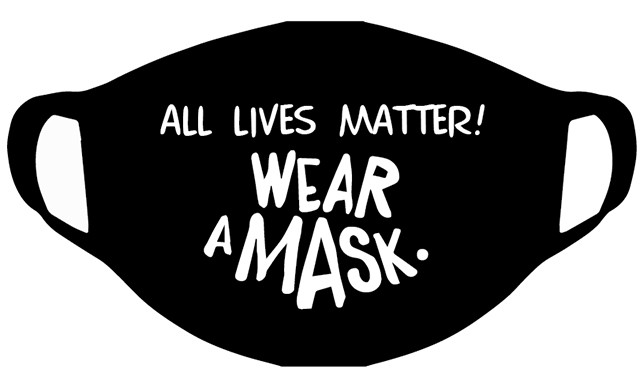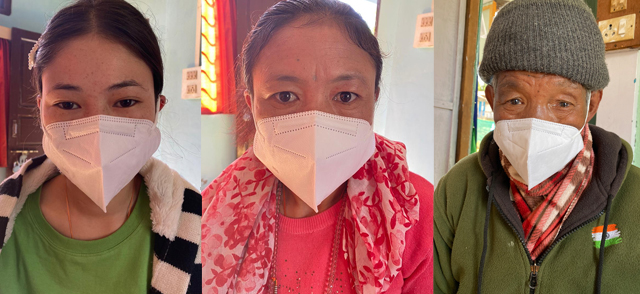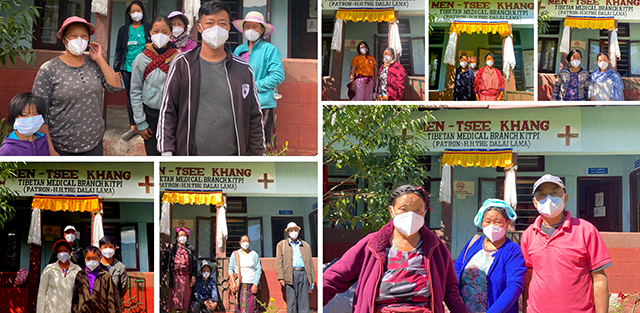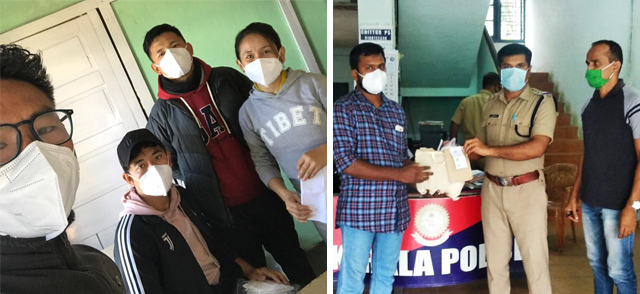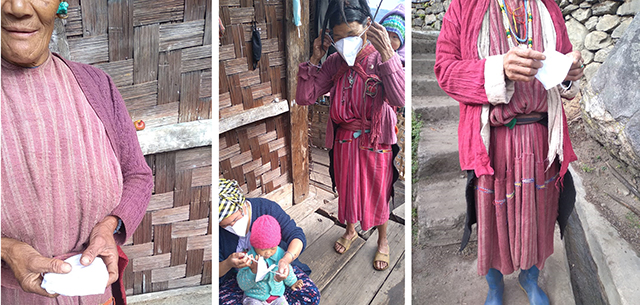|
The Wellbeing Programme is a philanthropic initiative by Friends of Tibet, a non-profit organisation founded in 1999 to support the cause of Tibet and to create awareness about the issue of Tibet amongst people all over the world. This initiative researched, designed and implemented by Friends of Tibet aims at the restoration, propagation and promotion of the endangered traditions and practices of Tibet.
⋯ Spreading Masks in the Time of a Pandemic Author: Suresh Babu* Publishing Date: November 9, 2020
#SPREADINGMASKS is one of the latest philanthropic initiatives from 'The Mask Lab,' Mumbai and 'Friends of Tibet Foundation for the Wellbeing'. These organisations have collaborated for the purpose of laying down a foundation for the wellbeing of people, especially the frontline workers of three Indian states — Karnataka, Kerala and Arunachal Pradesh in their struggle to save human lives from the onslaught of the millennium's gravest threat of a virus pandemic originated in Wuhan, China. The pandemic has continued unabated for months together torturing and annihilating millions of lives in India and all over the world.
It may be noted that true to the core spirit and the literal meaning of our philanthropic wing, we have been organising preventive and curative 'foundational wellbeing' programmes for the last two decades through various projects such as conducting regular Wellbeing Medical Camps in Kerala and Mumbai.
Global scientific research establishes the fact that the Covid virus remains in the air for several minutes or more when expelled by someone infected by coughing, talking or breathing. To prevent people around them or passers by, from getting infected with this deadly infectious virus and suppress its transmission, surgical masks have been found to be a key preventive measure. Thus, wearing medical masks is an important requirement to reduce potential risks from an infected person(s) whether they show Covid symptoms or not.
When we look back at the history of face masks, it is a strange coincidence that they came into use around 1910-11, nearly a century ago, when the Manchurian Plague originated in China. The influenza pandemic of 1918-19 turned face masks into a means of protecting medical workers and patients from infectious diseases outside the operating room. During the Spanish flu pandemic, wearing a mask became mandatory for police forces, medical workers and even residents where the decline in deaths from that pandemic was partly attributed to the mandatory mask-wearing policies on the conviction that masks protected the wearer against infections. Those carefully designed, manufactured, tested, reusable masks were an essential part of the medical arsenal and were in use until the 1970s all over the world. However, industrial production, additional research and development, use of reusable masks were largely halted with the transition towards disposable masks which remains even today an essential part of Personal Protective Equipment (PPE), especially to counter the global crisis generated by the highly infectious Wuhan virus.
Tibetan refugees in Arunachal Pradesh wearing The Mask Lab facemasks during the #SpreadingMasks initiative of Control Print, Mumbai supported by Friends of Tibet Foundation for the Wellbeing in three Indian states. Friends of Tibet volunteers and Men-Tsee-Khang staff members are distributing free surgical facemasks among health/sanitation workers and volunteers in Arunachal Pradesh, Karnataka and Kerala since September 2020.
(Left): Dr Tenzin Gelek of Men-Tsee-Khang, Tibetan Medical and Astrological Institute of HH the Dalai Lama with his team members at the Tawang clinic. He's been instrumental in #SpreadingMasks initiative in Arunachal Pradesh. (Right): Sreejith from the Daya Charitable Trust distributes 'The Mask Lab' free surgical facemasks among officers of Chittur Police Station, Kerala representing Control Print and Friends of Tibet Foundation for the Wellbeing.
The Maks Lab produced medical quality Made in India N95 facemasks are being distributed in Khet village, near Tawang, Arunachal Pradesh, India by the medical team led by Dr Tenzin Gelek of Men-Tsee-Khang, Tibetan Medical and Astrological Institute of HH the Dalai Lama in December 2020.
Surgical masks are capable of protecting people against infectious agents transmitted by droplets which can be saliva or secretions from the upper respiratory tract when the wearer exhales while talking, breathing or coughing. A surgical mask is made of three layers. A filter layer made of a melt-blown polymer, most commonly polypropylene placed between two rows woven fabric layers. The melt-blown material prevents the microbes/virus from exiting the mask. If everyone — infected as well as healthy — wears a mask and respect hygiene and social distancing and other such protocols and safety measures it could be possible to reduce the risk of transmission of any virus to a great extent.
Radio Free Asia (RFA) interview with Dr Tenzin Gelek on the #SpreadingMasks initiative of The Mask Lab and Friends of Tibet Foundation for the Wellbeing (Language: Tibetan; Date: December 14, 2020)
Business India report on #SpreadingMasks Campaign in India (February-March 2021)
The Mask Lab, a venture of Control Print, Mumbai produces highly protective superior quality masks
In order to identify and provide these masks to those who really need them — largely the frontline health workers and others, who are fighting the deadly Wuhan virus pandemic — we have devised an orderly, and reliable mask distribution system. Accordingly, Men-Tsee-Khang was given the first preference in this regard. Dr Tenzin Gelek from the Men-Tsee-Khang, Tawang is credited with treating and curing the one and the only Covid patient in the state with Sowa-Rigpa or Tibetan medicine. Taking the initiative of #SpreadingMasks campaign in Arunachal Pradesh, Dr Gelek said "The mask distribution in Tawang starts with our own patients coming to the Men-Tsee-Khang clinic. We give them free masks provided by The Mask Lab and educate them about how important it is to wear masks in these pandemic times." The Men-Tsee-Khang Clinic, Tawang, Arunachal Pradesh has already distributed thousands of free facemasks among their own patients and those who live in the nearby villages where quality masks never reach.
In the meantime, Friends of Tibet Volunteers residing and working from different locations have taken up the initial distributions of the masks to front line health workers such as employees in health clinics, ambulance drivers, police personnel, postal services people, service providers/volunteers and inmates of destitute homes, old age homes, palliative care homes, holistic health promoters and societies, traditional medicine practitioners, women's empowerment groups and others. Both The Mask Lab, Mumbai and Friends of Tibet Foundation for the Wellbeing hope to provide free masks under the well-appreciated #SpreadingMasks campaign to people in all the above mentioned service categories in the days to come.
All Lives Matter! Wear A Mask!
This close-up view of a sneeze filmed at 2000 frames per second (duration 0.25 sec) shows it's a hot, moist, turbulent gas cloud containing air and mucosalivary droplets that travel as far as 26 feet (7-8 meters). Current social distancing recommendations for the COVID-19 pandemic specify 6 feet of separation. The physics of sneezes and coughs have implications for respiratory pathogen transmission and mask and respirator design. (Video: Lydia Bourouiba / JAMA Network)
Friends of Tibet Foundation for the Wellbeing, PO Box 16674, Mumbai 400050, India.
⋯
Digital Support: Design & People, India + Ibiblio Digital Library & Archive Project, University of North Carolina, USA |
